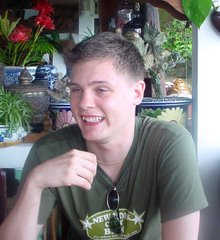Ableness
At the moment I am reading a master thesis in psychology by Jannica Stålnacke (http://www.diva-portal.org/su/abstract.xsql?dbid=7061) regarding ableness or talent in the logical-analytical sense (the Swedish term for ableness would be 'särbegåvning'). I found this thesis through the webpage of Mensa and a lot of the thesis have been written in collaboration with Mensa.
Though I haven't read that much of it yet I find it very interesting. I recognize myself in many of the descriptions about exceptional abilities in the logical-analytical sense - for example the possibilities available but at the same time a feeling of not really belonging. This was obviously more true in the first years of school compared to the life of university and work. The thesis also mentions that unlike talent in sports, art and music, logical-analytical strengths are rarely promoted and developed in school. The Swedish school system is in these subjects based on threshold where the goal is to get everyone across a certain threshold - not to develop each individual to the best of their capacity. The thesis states that in Sweden, these individuals have to find their own ways and strategies to develop and adapt their ability.
I guess this is true for me as well. I have always found school quite easy, but thanks to my parents and later on personal interests like Mensa and other things have helped develop my abilities and my understanding of myself. Thanks mom and dad for this - for challenging me to reach further and to develop my mathematical, logical and analytical skills!
The thesis also mentions social adaptability and high IQ. They've done tests that show that most persons with a high IQ often are well balanced, confident, outgoing and had the ability to get confidence and friendship from persons of the same age. I guess all of those are quite true for me. They also say that "the socially optimal IQ is between 125 and 155" - more than that and you often have a hard time adapting and fitting in to the society. Last time I did a IQ-test (just a short trial version - the trial test on Mensa's homepage) it said "You have an IQ of 135 or more - well within the 2% of the population needed to enter Mensa". I guess that meant that I got all correct answers on the test in 7 out of 8 minutes. Right now I'm looking into tests that test the higher IQ-scores with a better precision - I really like solving tests like these.
Anyway - to anyone interested in understanding a bit more about my thoughts, in the subject in general or with talented children in school-age I really recommend to read the thesis or at least just the first part.
I was not sure whether to post this entry or not. It feels a bit like ... just writing about how good I am or whatever. But I think that at least those of you who know me also understand that this is just yet another of my random thoughts. Any comments - just post them and let me know!

1 kommentar:
Jag är rätt skeptisk till IQ och intelligens för abstrakta uppgifter vilket ju är det som IQ-tester mäter. Visst - det är en tillgång om det kombineras med andra färdigheter. Men några av dem som jag minns från KTH-tiden som då hade väldigt goda tentaresultat tycks ha landat illa i livet. Det kan naturligtvis vara otur eller något annat men det tycks mig som fantasi, rörlighet, empati, inlevelseförmåga, social anpassning kanske har varit sämre utvecklade än den abstrakt-logiska tankeförmågan.
Skicka en kommentar